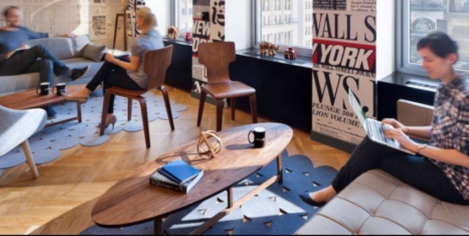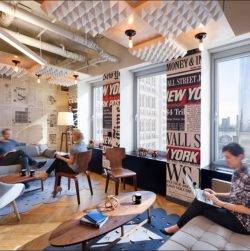To provide the best experiences, we use technologies like cookies to store and/or access device information. Consenting to these technologies will allow us to process data such as browsing behaviour or unique IDs on this site. Not consenting or withdrawing consent, may adversely affect certain features and functions.
The technical storage or access is strictly necessary for the legitimate purpose of enabling the use of a specific service explicitly requested by the subscriber or user, or for the sole purpose of carrying out the transmission of a communication over an electronic communications network.
The technical storage or access is necessary for the legitimate purpose of storing preferences that are not requested by the subscriber or user.
The technical storage or access that is used exclusively for statistical purposes.
The technical storage or access that is used exclusively for anonymous statistical purposes. Without a subpoena, voluntary compliance on the part of your Internet Service Provider, or additional records from a third party, information stored or retrieved for this purpose alone cannot usually be used to identify you.
The technical storage or access is required to create user profiles to send advertising, or to track the user on a website or across several websites for similar marketing purposes.
 The UK’s workplace happiness rating comes in at tenth in a new study published by Engaging Works. Austria, The Netherlands, United States and Germany are all above the UK in rating workplace happiness. The UK’s average happiness score of 6.43 lags behind Austria’s 7.67. Engaging Works has surveyed over 10,000 employees globally with the workplace happiness survey. Its’ founder, Lord Mark Price, is calling for the Government to face up to the UK’s poor productivity levels and understand the importance of getting the UK’s workforce more engaged and happier.
The UK’s workplace happiness rating comes in at tenth in a new study published by Engaging Works. Austria, The Netherlands, United States and Germany are all above the UK in rating workplace happiness. The UK’s average happiness score of 6.43 lags behind Austria’s 7.67. Engaging Works has surveyed over 10,000 employees globally with the workplace happiness survey. Its’ founder, Lord Mark Price, is calling for the Government to face up to the UK’s poor productivity levels and understand the importance of getting the UK’s workforce more engaged and happier.







 Over half of workers (53 percent) believe that getting the right people with the right skills will be the biggest issue faced by their workplace in the year ahead. This is according to research published by Acas today, which commissioned YouGov to find out what UK employees identified as the most important workplace issues in the year ahead. The other two top issues identified were technological change (36 percent) and productivity (36 percent). Other issues identified by participants in the poll included fit and healthy staff (18 percent) and Equality and Fairness (17 percent). Acas Chief Exec, Susan Clews, said: “Employees feel that getting workers with the right skills is a key concern in the year ahead. This could be attributed to uncertainty around our relationship with the EU at the moment or general concerns around skills shortages.
Over half of workers (53 percent) believe that getting the right people with the right skills will be the biggest issue faced by their workplace in the year ahead. This is according to research published by Acas today, which commissioned YouGov to find out what UK employees identified as the most important workplace issues in the year ahead. The other two top issues identified were technological change (36 percent) and productivity (36 percent). Other issues identified by participants in the poll included fit and healthy staff (18 percent) and Equality and Fairness (17 percent). Acas Chief Exec, Susan Clews, said: “Employees feel that getting workers with the right skills is a key concern in the year ahead. This could be attributed to uncertainty around our relationship with the EU at the moment or general concerns around skills shortages.


 Just three days into the New Year, today (Friday 4 January), the UK’s top bosses will have made more than a typical full-time worker will earn in the entire year, according to calculations from independent think tank the High Pay Centre and the CIPD. The average (median) full-time worker in the UK earns a gross annual salary of £29,574, while the average FTSE 100 CEO, on an average (median) pay packet of £3.9 million, only needs to work until 1pm on Friday 4 January 2019 to earn the same amount. The £3.9 million figure was calculated by the CIPD and the High Pay Centre in their
Just three days into the New Year, today (Friday 4 January), the UK’s top bosses will have made more than a typical full-time worker will earn in the entire year, according to calculations from independent think tank the High Pay Centre and the CIPD. The average (median) full-time worker in the UK earns a gross annual salary of £29,574, while the average FTSE 100 CEO, on an average (median) pay packet of £3.9 million, only needs to work until 1pm on Friday 4 January 2019 to earn the same amount. The £3.9 million figure was calculated by the CIPD and the High Pay Centre in their 




















January 8, 2019
From nudge tech to listening tools, Gartner makes some workplace predictions for 2019
by Brian Kropp • AI, Comment, Technology, Workplace
Last year we saw businesses reporting their gender pay gap, General Data Protection Regulation (GDPR) taking effect, speculation on how Brexit will impact jobs and further impact on how technology is changing the way we work. Looking forward to the year ahead, Gartner has pulled together a fresh set of workplace predictions for the coming year. This includes the demise of employee surveys as the adoption of sophisticated listening tools accelerates; precious little progress in closing the gender pay gap, but the evolution of discrepancies in pay scales between new hires and existing employees; the rise and rise of the #MeToo movement, which could lead to more senior executives being ousted in 2019 than in 2018; and new technologies designed to nudge workers into action.
(more…)